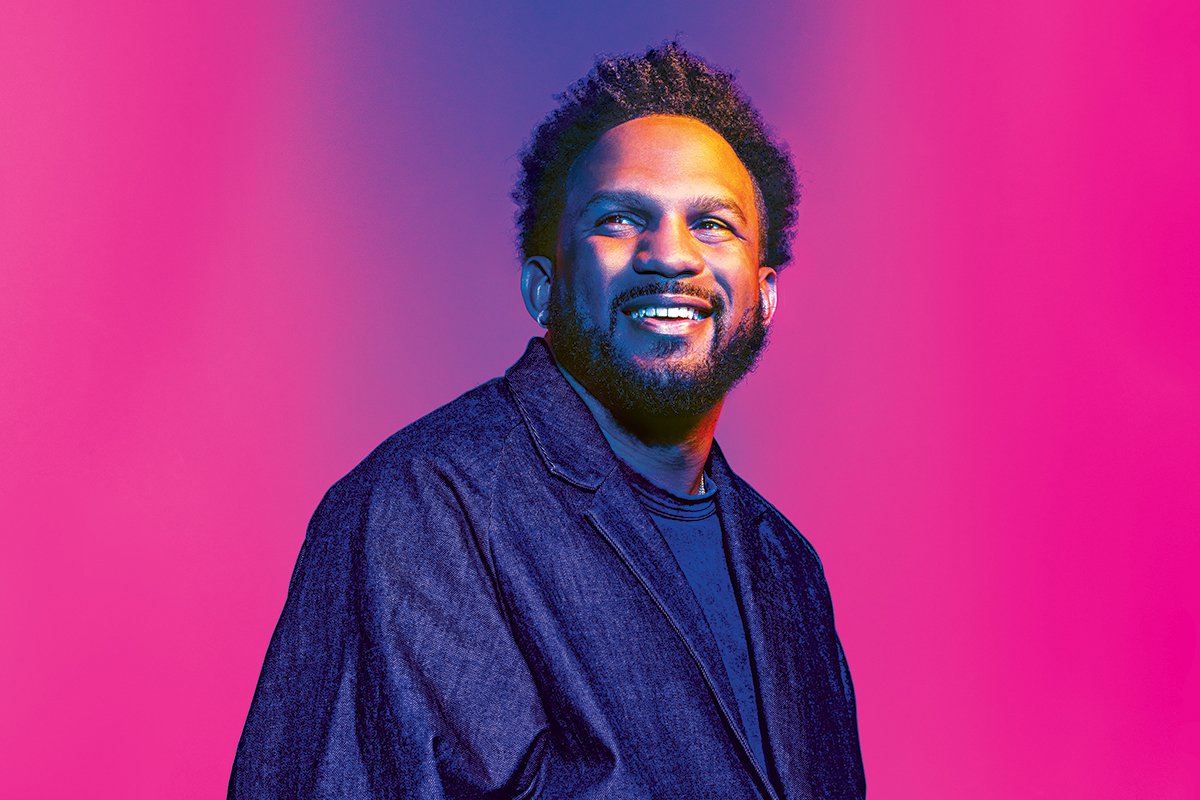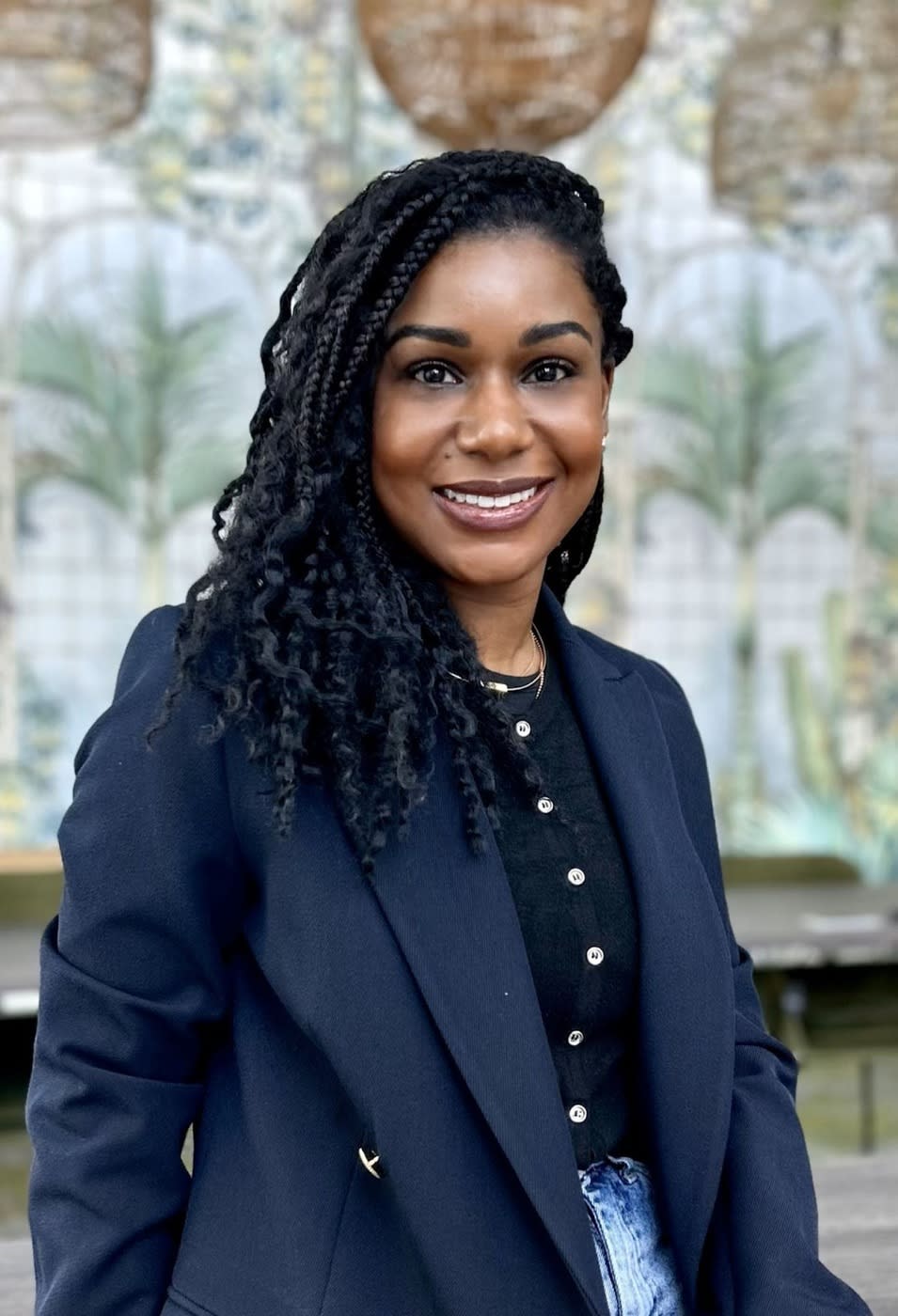
Everette Taylor says his journey from South Richmond to New York City, where he has led the crowdfunding site Kickstarter since 2022, has been paved with kindness.
“It’s something that has absolutely changed my life,” the 35-year-old CEO says, emphasizing that one must also pay that kindness forward. “I really do believe it returns it back into your life.”
Taylor’s life story touches on the reality of growing up in Richmond in the ’90s, the importance of community and public places, how to succeed, and how to create opportunities for others along the way. And on May 10, he summarized that journey for Virginia Commonwealth University students as the commencement speaker at their graduation.
“It’s such a surreal moment for me because I grew up 10 minutes away on the south side of the city … but my whole life has been about doing things that weren’t imaginable for people coming from my background and my situation, and that’s the thing that keeps me going and inspires the work that I do at Kickstarter every single day.”
Origin Story
Taylor has been an entrepreneur from the start. Born in 1989, he grew up in the Broad Rock neighborhood in South Side with his younger sister, Erika, and mother, Millicent, a custodian at the Federal Reserve Bank of Richmond.
“She worked nights,” he recalls, “and so I grew up really having to take care of myself and figure things out for myself … but growing up independent also meant that I spent a lot of time out in the streets.”
Richmond wasn’t an easy place to be at that time. In the ’90s, annual homicides hit triple digits, causing the city to be dubbed the murder capital of America in 1997. Police at the time attributed the violence to the prevalence of crack cocaine.
“Most of the men in my family were in jail, on drugs, caught up in the wrong things, and those are the things that I saw around me in Richmond,” Taylor says. “And I knew that, as a young kid, I was impressionable. So, some of the people that I saw with the most things, like the nice cars and the Jordans and the jewelry, they were dealing drugs, and they were doing things that they shouldn’t have been doing.”
One of his first entrepreneurial endeavors involved buying bubble gum from a corner store and selling it to his fellow students at a markup. Taylor also mowed lawns with his cousin. “We were always trying to find different ways where we could hustle and make a little bit of money for ourselves,” he says. “I wanted enough money to be able to take care of myself and to be able to get things from the store, do things that I wanted to do as a kid,” which included fueling an early interest in the arts.
By the time he was in middle school, however, Taylor says he had fallen in with the wrong crowd and was selling marijuana. He credits his mom with putting him back on the straight and narrow. “I think that was scary for her,” he says, “because she saw what happened to other men in my family.” Part of that intervention was getting her teenager a job interview with Eastern National, a nonprofit that operates gift stores nationwide at public places such as the Richmond National Battlefield Park. Taylor says her efforts and the job “genuinely saved my life.”
Past and Future
Taylor says he soon found himself in a room with Eastern National’s Robert Koch, who was looking for a new marketing and sales associate.
“I was a kid, 14 years old, from the streets of Richmond, and I knew nothing about marketing. I knew nothing about sales,” Taylor says. “He gave me a shot with this job. And what this job did, one, was it introduced me to marketing, which was something that ended up changing my life. No. 2, it got me off the streets of Richmond and gave me something to do and also helped me make enough money to help support my mom. And three, it opened my eyes.” He describes it as his first time “actually being around white people” and “meeting different people” from America and abroad. Working in the gift stores around the city also exposed him to local history.
“I had to learn about Jackson Ward and the prominence of Black entrepreneurs and Black lawyers and doctors and the Black entertainers and … all of that stuff happening right there in my city, like 10 minutes from where I live,” he says.
His senior year of high school, however, threw him a curveball. Eastern National eliminated his job after three years, but his experience with local historic sites led him to become a Richmond National Battlefield Park ranger at 17, working at places including Tredegar Iron Works and the Maggie L. Walker National Historical Site.
He also found himself living out of a car that didn’t work. “That was a really, really tough time in my life,” he recounts, “but it was also a very transformational period in my life, because it was when I discovered the world of tech.”
During this period, Taylor frequented the Broad Rock Branch Library to beat the heat and surf the web. It was here that he read about Mark Zuckerburg and Jack Dorsey and their fledgling social media sites, Facebook and Twitter. A new path opened for him. “The beauty of that situation, of being homeless, was the opportunity [to discover] that world” of tech startups, he says.
At the same time, working as a park ranger at Civil War battlefields “opened my eyes to all different types of people, and it gave me the ability to be able to talk to anyone.” He was encouraged by fellow park ranger and historian Mike Gorman to look into college, which led Taylor to search online for “tech schools in Virginia.” This, predictably, turned up Virginia Tech, where he applied and was accepted. “It surprised me,” he says.
In an email, Gorman says Taylor “immediately impressed me because he possessed a curiosity and drive unusual even among the seasoned people at the [National Park Service]. … I remember a thought I had (and hopefully expressed) back in the day: One day, we’ll all be working for this guy!”
Silicon Valley Vision
Taylor’s first stint at Virginia Tech was rough.
“I wanted to build tech. I’ll be honest, I wasn’t the best coder or developer. I was decent,” he recalls about studying computer science. “I probably spent much too much time my freshman year — especially the first semester of my freshman year — partying. I had like a 2.0 GPA.”
By his second semester, he says he was “locked in” and his GPA and his horizons were expanding. However, a family situation forced him to drop out in his second year and return home. He found himself working in a Chesterfield County Jo-Ann fabrics store, wondering if he was making any money after paying for gas and food.
His proclivity for throwing parties, however, was unimpeded. “That was what I was good at at the time,” he says.
It was in this context that he started his first business at age 19: EZ Events. “Not only did we throw parties” from Richmond to Greensboro, North Carolina, he says, “we built technology for people to buy tickets,” creating a kind of precursor to online marketplace Eventbrite. In 2011, he sold the business and was able to return to Virginia Tech. “I didn’t make a ton of money,” he says, “but that was like my first big success as an entrepreneur.” He later learned the buyer of EZ Events sold the company again for “millions and millions of dollars.”
“That’s when I really started to learn about Silicon Valley,” he says. “I was like, ‘I need to leave Virginia.’” Two weeks later, he says, he left Blacksburg without a degree and drove to California.
Taylor quickly found himself under the wing of startup growth guru Sean Ellis, running marketing for one of Ellis’ businesses. He soon started several of his own ventures, such as the marketing firm Millisense, named for his mother, under ET Enterprises. His success drew the attention of Sticker Mule, a custom decal company, which Taylor joined as chief marketing officer at 25 years old. He would go on to successfully manage marketing efforts for Artsy, a sales platform for fine art, which landed him on a Forbes list of the “World’s Most Influential CMOs” and led to a profile in the Financial Times. This buzz led Kickstarter to consider and then hire him as CEO in September 2022.
“I’m still surprised to this day that I got the opportunity, because I was a very unorthodox candidate,” Taylor muses. “Things moved very, very fast in my career, and I feel very fortunate.”
As CEO, Taylor has acted to keep creators and supporters involved beyond the initial fundraising process, deploying tools to make Kickstarter a more comprehensive crowdfunding platform, introducing security features and improving the vetting process for projects.
“When I came to Kickstarter, we were in a decline,” he says. “And every year I’ve been at Kickstarter, we’ve grown and grown. … We’ve had more people launch projects this year already than ever [before]. We’re seeing extraordinary growth at the company.”
Local Impact
Since its start in 2009, Kickstarter campaigns have helped Richmonders produce books, food trucks, tabletop games, skin care products and needle-felted magnetic slugs, to name a few projects.
What has drawn the most attention on the platform has been support for creative endeavors and the website’s capacity to engage supporters. For the band Carbon Leaf — which is returning to its hometown of Richmond for a Music at Maymont show on Aug. 2 — Kickstarter was “a great way to give shape to those fans and the direct connection to what we do as artists, which is try and make something that resonates,” lead singer Barry Privett says. Launched in 2020, the campaign for the band’s 21st album eventually produced last year’s “Time Is the Playground.”
“We have done several fan-funded projects before, like through PledgeMusic, but this was our first Kickstarter,” Privett says. “We don’t need cash to make a record; we want fans to feel involved and feel excited to participate.”
Crowdfunding has also helped local businesses launch or expand. In the city, New York Deli was able to add a rooftop bar and event space, while the entrepreneurs behind Pizza Bones, Proper Pie Co. and Spotty Dog Ice Cream Co. — among many others — were able to afford permanent spaces.
The North Side ice cream shop Ruby Scoops was another of those new businesses. Owner Rabia Kamara launched a $15,000 campaign in 2020 — “my real goal was $30K, but I put [$15,000] so that I would get funded,” she says — that was fully funded in two or three days, eventually reaching $32,191. “It was basically my job for two weeks,” the VCU graduate recalls. “It’s all I did, talk about Kickstarter. We made videos and all sorts of stuff.”
That all-hands-on-deck experience also makes it an ideal learning tool for the students and graduates of VCU’s da Vinci Center for Innovation such as Jacked! Jackfruit Jerky’s Julien Reininger and Malique Middleton of Gewd Botanicals. “It takes things out of the theoretical and makes it very real,” says Garrett Westlake, the center’s executive director. “The difference [with] putting [an idea] on a platform like Kickstarter is you can find out whether it’s a million-dollar idea.”
Opening Doors
In February, Taylor visited the da Vinci Center, and his impression on students — and VCU President Michael Rao — led to his selection as the university’s 2025 commencement speaker.
“I think Everett’s career path and his success looks different than a lot of people’s,” Westlake says, “and I think that permission to achieve in a different sort of way is the message that I think will really resonate with VCU students.”
Graduation won’t be the last time Taylor visits VCU, either. Westlake says Taylor will be an affiliate faculty member for the 2025-26 school year, allowing him to be a guest lecturer and student mentor. VCU is also exploring a potential scholarship in Taylor’s honor to benefit a nontraditional graduate student, according to Westlake.
“I’m excited for that — that’s pretty sick,” Taylor says. “I was the first person in my family to go to college, … and most people I grew up around, they weren’t going to school or college or anything like that.”
Ahead of his commencement speech, Taylor said he hopes to impress upon the class of 2025 that their circumstances shouldn’t dictate their futures and that “time is the most valuable thing that we have. Spending time with the people that you love and the things that you love is the most important aspect of life and, on the flip side, in terms of leading yourself to success, [is] understanding the sacrifices that you have to make and understanding how you use your time to get to where you want to be.”
Spending time away from Richmond has only increased his appreciation for it, Taylor says while standing outside the Broad Rock library. “Being [from] here, we wear that with a badge of honor because we dealt with a lot of stuff. I appreciate all the hardships and all the things that I experienced because it made me tough as nails.”
Today, South Side is also a place for reflection and connection.
“My grandmother Mable Taylor passed away this January,” Taylor says. “She would just tell me how proud she was of me and how she couldn’t even understand the magnitude of the things that I was doing because what I’ve done in my career so far surpasses what anything in my family or the people in my neighborhood that I grew up in have been able to do. And I feel so fortunate to be in that position now, to be able to inspire others and come back to Richmond and deliver this commencement speech and hopefully inspire a new generation of people.”


